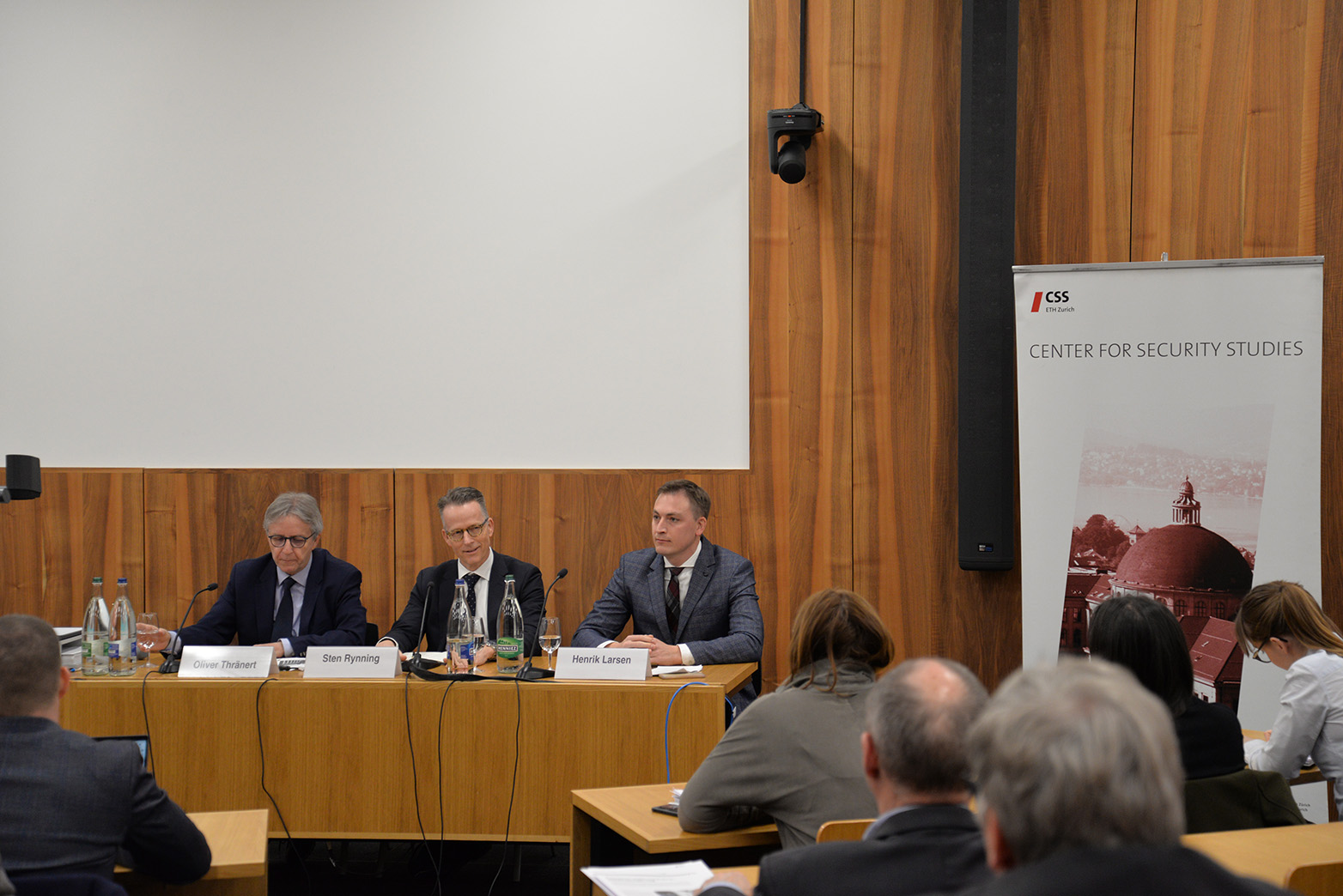ETH Evening Talks: “Russia’s War against Ukraine: Implications for NATO”
How does the war in Ukraine affect NATO? What will be the future of the alliance? During the ETH Evening Talk on the implications of Russia's war of aggression for NATO on March 15, 2023, Sten Rynning and Henrik Larsen provided answers.

The invited speaker Sten Rynning, Professor of War Studies, and Chair at the Danish Institute for Advanced Studies at the University of Southern Denmark and, until recently, a non-resident fellow of the NATO Defense College, and CSS’ Henrik Larsen, Senior Researcher on NATO and transatlantic relations, discussed NATO’s adaptation to Russia’s aggression and presented their views about the future of NATO’s deterrence and Europe’s strategic responsibility.
NATO’s Evolution from 1990 to February 2022
In his presentation, Sten Rynning addressed the historical evolution of NATO. The so-called NATO 2.0. was essentially the alliance created in the early 1990s and which lasted until February 2022 when Russia invaded Ukraine. During this time, NATO advanced and expanded in terms of membership and political functions, leading to a “big, soft security NATO”. In this regard, while the alliance transformed and expanded politically, it did not expand in terms of defensive military capabilities. In the Founding Act on Mutual Relations, Cooperation and Security signed by the Allies and Russia in 1997, the two sides agreed to provide for a lasting and inclusive peace in Europe. NATO’s part of the contract was that it would continue to expand its political function, but not militarily. Russia’s part, on the other hand, was that it must continue its political and economic transformation towards a more open, democratic society. Over the course of the next years, despite a demonstrative speech by Putin at the Munich Security Conference in 2007 where he made it very clear that he was extremely uncomfortable with the direction in which the European security architecture was developing, the allies were slow to realize that Russia was becoming a serious challenge for stability in Europe. With the U.S. being busy with the Global War on Terror and Europe occupied with the Euro Crisis, political attention and energy was consumed by other issues. The ability and willingness to focus on classical geopolitics were simply not there, Rynning argued. The gradual nationalization of militaries and political processes within NATO member states then culminated in French President Macron declaring the alliance practically “brain dead”. Hence, the allies collectively neglected to take the growing Russian threat seriously until Putin invaded Ukraine in February 2022.
Adapting to the Russian Threat and Building Resilience
Henrik Larsen spoke about how NATO adapts to Russia’s aggression. The alliance is visibly transitioning to a significantly more ambitious force model. Secretary-General Stoltenberg has announced to boost the number of troops on high alert by more than sevenfold to over 300,000 which reflects NATO’s adoption of a new strategy describing Moscow as a direct threat. While Larsen sees this increase in readiness as a positive development, he believes that the West needs further thinking about the Kremlin’s rationale behind this war. In his understanding, Putin is pursuing a dream of restoring parts of the Russian motherland territory and NATO should adapt its strategy according to these imperial aspirations.
Moreover, NATO must increase its general resilience, which refers to the ability to withstand external shocks and recover from these shocks. This concerns, for example, European countries becoming vulnerable to Chinese technology. There has been a tendency within NATO to do more than defense and security in recent years, especially at the expert level. However, Larsen warned that NATO should remain a defense and security alliance and not necessarily extend to the civilian areas of security where it has no special competency.
Europe Must Take Responsibility on Burden-Sharing
According to Larsen, it is crucial that European NATO states carry the main burden of the defense against and deterrence of Russia. Since the United States’ increasingly centers on the deterrence of China, Europe must take responsibility and increase its ability to defend itself without relying on the U.S. for support. Moreover, it should not be underestimated how American domestic politics shape the global security environment. The possible return of Trump or a like-minded president in 2025 is possible with narrative of continued European free-riding on the American taxpayer. Therefore, Europe must prepare for the scenario that the U.S. may not fully commit to the European continent. However, Larsen doubts that, in the long-run, there is a prospect of completely replacing the U.S. defense, especially regarding military support structure and nuclear deterrence. Hence, Europeans should increase their existing capabilities where they can relatively easy build up infrastructure.
After the presentations, the audience had the opportunity to ask Sten Rynning and Henrik Larsen questions.